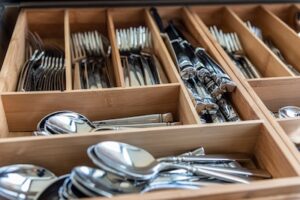How to Organize a Small Kitchen?
Organizing a small kitchen can be a daunting task, especially if you have limited space. However, with the right strategies and tools, it can be an easy and enjoyable process. A well-organized kitchen can save you time and energy when cooking, making meal prep more efficient and enjoyable. So, how do you organize a small kitchen?
Here are some tips and tricks for organizing a small kitchen:
- Clear the Clutter
- Use Cabinet Organizers
- Use Drawer Dividers
- Utilize Vertical Wall Space
- Label Everything
- Invest in Space-Saving Tools
- Invest in Multi-Use Tools
- Store Items Strategically
- Group Similiar Items Together
- Create Zones
- Keep Countertops Clear
- Keep It Clean
In this blog post, we are going to explore the variety of ways to make the most out of small, compact kitchens. Get creative and organized with these clever solutions that ensure everything has its place – so no more rummaging around looking for what you need in a pinch!

12 Small Kitchen Organization Tips & Tricks
Keeping a small kitchen organized can be a challenge, but with a few tips and tricks such as kitchen organizers, you can make the most of your space and create a functional and efficient cooking area. Here are some small kitchen organization tips and tricks that can help:
1. Clear the Clutter and Simplify
The first step to organizing your small kitchen is to declutter and simplify. Go through your kitchen and get rid of anything that you no longer need or use. This includes expired food, duplicate utensils or gadgets, and anything that takes up space without adding value to your kitchen. Simplifying your kitchen will not only make it easier to organize but also create more space.
This is one of the best ways to make your small kitchen feel larger and get rid of stress. So be honest with yourself about what you actually use and donate, sell, or toss the rest.
2. Use Cabinet Organizers
Cabinet organizers can help you maximize your storage space and keep everything in its place. Consider using pull-out baskets or shelf risers to store small items or pots and pans.
Also, you can use the back of cabinet doors. This is an often overlooked space that can be used to maximize storage in your small kitchen. Install hooks or small shelves to store frequently used items like rubber cutting boards, measuring cups, and utensils. This will keep everything within reach while freeing up valuable counter space.
3. Utilize Vertical Wall Space
When it comes to organizing a small kitchen, maximizing vertical space is key. So, don’t forget about your walls. Use wall-mounted shelves or racks to store frequently used items like spices, cookbooks, and utensils. You can also hang pots and pans from a ceiling-mounted rack or install magnetic knife strips to hold them and free up counter space.
4. Label Everything
Labeling everything in your kitchen is a simple but effective way to stay organized. Use labels to mark the contents of storage containers, drawers, cabinets, and pantry items. This will help you find what you need quickly and prevent clutter. This can help you keep track of what you have and where it belongs. This can save you time and help you avoid buying duplicates.
5. Use Drawer Dividers
Drawers can quickly become a jumbled mess, making it difficult to find what you need. Drawer dividers are an excellent way to keep utensils, cutlery, and other small items organized and easy to access. They can also prevent clutter and ensure that everything has its place.

6. Invest in Space-Saving Tools
There are plenty of space-saving tools and gadgets available that can help you organize your small kitchen. Consider investing in collapsible measuring cups and spoons, stackable storage containers, and a compact dish rack. These tools can help you make the most of your limited space while still having everything you need within reach.
Another great space-saving tool is a pegboard. A pegboard is an affordable and versatile way to add storage to your small kitchen. You can hang pots, pans, utensils, and even small appliances on it, keeping them easily accessible.
7. Invest in Multi-Use Tools
Space-saving kitchen tools that can do more than one job are invaluable in a small kitchen. For example, a food processor that can also blend and chop, or a mixer that can also knead dough.
8. Store Items Strategically
When organizing a small kitchen, it’s important to store items strategically. Keep frequently used items like pots and pans within easy reach, and store infrequently used items like specialty baking pans on higher shelves or in less accessible areas. This will help you make the most of your limited space while still having everything you need within reach.
9. Group Similiar Items Together
Grouping similar items together is an effective way to organize your small kitchen. For example, store all your baking supplies like flour, sugar, and baking powder in one area, and keep your cooking oils and spices together. This will make it easier to find what you need and prevent clutter. Just remember to properly store items such as food, properly so that its safety and quality is preserved.
10. Create Zones
Creating zones in your kitchen can help you keep everything organized and efficient. For example, designate one area for food prep, another for cooking, and a third for cleaning up. This will help you stay organized and focused when you’re working in the kitchen.
11. Keep Countertops Clear
Keeping your countertops clutter-free is essential in a small kitchen. Consider using a countertop storage unit or hanging baskets for frequently used items.
12. Keep It Clean
Finally, keeping your small kitchen clean and tidy is essential for staying organized. Wipe down countertops, sweep the floors, and clean up spills as soon as they happen. A clean kitchen not only looks better but also makes it easier to find what you need and stay organized. If you find yourself too busy to clean and organize your kitchen yourself, you can always consider to hire a professional house cleaning service.

What to Consider When Organizing a Small Kitchen
When considering how to organize your small kitchen, there are a few things to keep in mind. Here are some factors to consider when organizing a small kitchen:
1. Your Cooking Style
Your cooking style should be one of the primary factors to consider when organizing a small kitchen. For example, if you frequently bake, you’ll need ample counter space, a place to store baking supplies, and a dedicated area for your mixer and other equipment. If you prefer to cook more savory dishes, you might need more storage space for pots, pans, and cooking utensils.
2. Available Space
The available space in your small kitchen is another important consideration. Measure your kitchen carefully to determine the size and layout of the space you have to work with. This will help you plan your storage solutions, such as shelves, racks, and drawers, to maximize every inch of space available.
3. Storage Needs
Storage needs will vary depending on your cooking style, the number of people in your household, and the types of food you typically prepare. Consider what types of items you’ll need to store, such as pots, pans, utensils, spices, and food staples. Then, plan your storage solutions accordingly.
4. Workflow
When organizing a small kitchen, it’s essential to consider the workflow. This means thinking about how you move around the space and what you need to access at different points in the cooking process. For example, you might want to store frequently used items, like spices and oils, close to your stove, while baking ingredients can be kept near your mixer.
5. Frequency of Use
Another consideration is the frequency of use for different items in your kitchen. The items you use most frequently should be stored in easily accessible areas, while those you use less frequently can be stored in less convenient locations. This will help you save space and make your kitchen more efficient.
6. Organization Systems
There are many organization systems to choose from, including drawer dividers, racks, and shelves. Consider which systems will work best for the items you need to store and the space you have available. For example, if you have limited counter space, a wall-mounted spice rack might be a better option than a countertop one.
7. Aesthetics
Finally, aesthetics are an important consideration when organizing a small kitchen. Your kitchen should be a space that you enjoy spending time in, and one that reflects your personal style. Choose storage solutions that are both functional and visually appealing to create a space that you’ll love to cook in.
In Closing
In conclusion, organizing a small kitchen can be a challenge, but with the right strategies and tools, it’s entirely possible. Decluttering, maximizing vertical space, investing in space-saving tools, and grouping similar items together are all effective ways to keep your kitchen organized and help you make the most of your space. It may take a little time and effort to implement these ideas, but the payoff will be worth it in the end.
